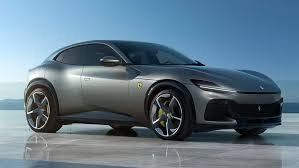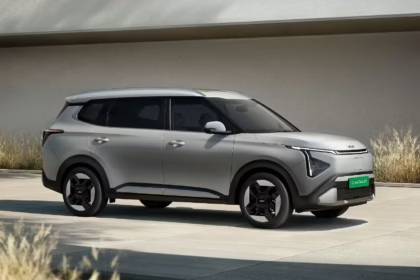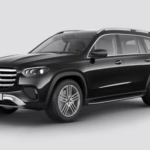Introduction
Ferrari EV is a name synonymous with roaring engines and elite performance, and is navigating a quieter path—the electric one. As the legendary Italian automaker edges toward an electrified future, it has big plans: multiple electric vehicles by the end of the decade, starting with its first EV set to debut in 2025. However, fresh industry reports suggest that Ferrari EV second electric model, once expected to follow closely behind, won’t arrive before 2028.
Why? An unexpected one for the high-performance luxury category: slow world demand for EVs, particularly in the ultra-premium space. Insider sources during the making indicate Ferrari EV is going slow as market excitement for electric supercars seems to fade, prompting the brand to hit the brakes on its next big jump.

Background: Ferrari EV Strategy So Far
Ferrari EV’s entry into the electric vehicle arena has exact specs that remain under wraps. Ferrari promises that its EV will uphold the brand’s legacy of performance, emotion, and exclusivity—even without the growl of a V12.
In addition to standalone models, Ferrari has been making definitive promises regarding electrification. The company intends to become carbon-neutral by 2030 through a combination of hybrids, electric cars, and eco-friendly production methods. With existing hybrids such as the SF90 Stradale on the road, the brand is slowly changing gears while not wanting to lose its core customer base.
Expectations in the market have been high. Enthusiasts and investors have been looking forward to how Ferrari, a brand synonymous with mechanical purity and driving passion, would reimagine the EV formula. But combining electric technology with the heart of a Ferrari EV is no easy feat, and it appears both the company and market are not in a hurry to push the next chapter.
The Delay: What We Know
According to people who know the Ferrari EV product roadmap, the company has quietly delayed its second Ferrari EV launch, at least through 2028. Ferrari has not made a public announcement about an updated timeline. Several people inside the company say the brand is consciously pacing its EV roll-out due to disappointing demand forecasts, especially among high-end luxury consumers.
Initially, the second Ferrari EV was expected to follow the 2025 debut of Ferrari EV first all-electric model, with some pointing to weak market demand as the primary factor, while others hinting at internal caution within Ferrari’s leadership. The brand is known for resisting mass-market trends in favour of exclusivity and perfection, and it may be holding back to ensure its next EV meets both performance expectations and brand identity. There are also whispers of supply chain and battery sourcing issues, particularly as Ferrari EV builds proprietary EV platforms in-house.
Weak Demand for Luxury EVs
Ferrari EV delay isn’t happening in isolation — it mirrors a broader slowdown in demand for ultra-luxury electric vehicles across global markets. While mainstream EV adoption continues to grow, the same can’t be said for the high-performance, high-price end of the spectrum.
Porsche, for example, introduced its electric Taycan to great praise but has recently had to realign production because of leveling demand. While the brand marches on electrifying legends such as the Macan, it is met with caution from traditional customers who continue to prefer internal combustion engines. Bentley has also quietly delayed its first full EV to 2026, having already committed to an all-electric lineup by 2030.
The problems are stacked. Most high-end auto buyers are still purists, attracted to the sound, feel, and heritage of petrol engines. For them, quiet and on-tap torque might not be enough to make up for the raw excitement they are used to from brands such as Ferrari. Thirdly, charging infrastructure — particularly for those used to convenience at all levels — is not yet smooth enough to premium standards. Range anxiety, while better, still afflicts perception, particularly in high-speed or performance-oriented driving situations.
Furthermore, luxury EVs typically come at a substantial premium, yet much lower-priced electric variants from mainstream manufacturers increasingly meet their performance advantages. This complicates it further to justify the price based on electrification alone — unless the car brings something exceptionally special.
Ferrari EV: Possible Pivot or Strategy Shift
With its second EV now deferred to 2028, Ferrari EV seems to be reconsidering its short-term electrification plans, and a strategic shift is in the cards. Far from rampantly adding to its EV portfolio, the company might double down on its hybrid strategy, which has already worked well with offerings such as the SF90 Stradale and 296 GTB.
These hybrid supercars enable Ferrari EV to find its middle ground between tradition and transformation by combining the latest electric assistance with the unmistakable, heart-pounding rush of combustion engines. For many long-time customers—and purists concerned about a completely silent Ferrari—this middle ground offers the best of both worlds. Therefore, insiders note that Ferrari might focus on developing more performance hybrids while closely watching the EV market dynamics.
There have also been whispers of revised internal product timelines, with some upcoming hybrid variants reportedly being fast-tracked while EV-only projects are being slowed down or reassessed. Ferrari EV management has not made public changes to its 2030 carbon neutrality roadmap, but this delay indicates possible flexibility in how they plan to get there.
Investor’s reaction to date has been subdued. The analysts get it: Ferrari EV plays in a niche where brand and exclusivity trump volume or speed-to-market. Most even view the delay as prudent — an indication that Ferrari is not going to risk watering down its DNA in the haste to electrify. The public has differing opinions. While some enthusiasts are still keen to know what an electric Ferrari can bring, others appreciate the brand’s prudent approach, suggesting that not all venerated manufacturers have to pursue trends on a schedule.
Market Impact & Competitor Landscape
Ferrari’s second EV until 2028 ripples across the high-performance Tesla‘s upcoming Roadster. However, it could challenge performance benchmarks in the electric supercar space, and its earlier launch could give it a head start in shaping public perception of what an electric performance car can be.
Porsche, while having slowed production in recent times, remains at the head of the luxury EV pack. The Taycan demonstrated that a high-performance EV from an established brand could be successful, but Porsche has also moved faster to diversify, with the electric Macan EV and planned future 718 EV already in the works. This parallel delay may soften competitive pressure, but Lamborghini is actively hyping its EV concept and could win the branding war if it moves faster with confidence.
Then there are outliers like Lotus and Rimac, niche players making bold EV bets with cutting-edge hypercars. Though smaller in scale, their early lead in electrification helps position them as tech-forward performance innovators — a space Ferrari risks ceding if delays continue. The key question remains: Will this postponement damage Ferrari EV credibility in the long term?
That is up to Ferrari EV. If the 2025 model is a jaw-dropping experience, then the company can afford to wait. But in an age of first impressions and momentum, Ferrari EV will have to make its eventual EVs not just competitive but category-leading. The wait gives it time, but it also creates expectations.
What to Expect Going Forward
While the 2028 timeline for Ferrari EV second EV appears to be the new target, many insiders see it as more of a placeholder than a hard launch date. Given how rapidly the EV market evolves — from battery tech to regulatory shifts — Ferrari is likely keeping its options open, adjusting its pace in response to both consumer sentiment and technological maturity. That said, Ferrari EV could still surprise the market with a concept car or a low-volume, track-focused EV variant well before 2028.
Another likely strategy is reframing Ferrari’s electrification narrative. Instead of rushing into EVs, Ferrari may emphasize its “emotion-first” philosophy, positioning its hybrids as performance evolutions rather than compromises. The message would be clear: Ferrari will go electric—but on its terms, and only when it can redefine electric performance with its signature flair.
To maintain buzz and investor confidence, Ferrari EV might also highlight advancements in its EV R&D, strategic partnerships in battery tech, or innovations in its upcoming hybrid platforms. Even without launching a second EV soon, controlled leaks, teaser campaigns, or limited insider previews could help sustain anticipation and keep Ferrari’s electric ambitions top of mind.
Effectively, the 2028 postponement isn’t Ferrari EV taking its foot off the pedal—it’s just calling for a more thoughtful, brand-focused development. Whether that equates to a market victory will depend on how effectively it can navigate expectation, emotion, and engineering greatness over the coming years.
Conclusion
Ferrari’s0000 EV journey is unfolding at a pace that reflects its heritage — not hurried, but calculated. Ferrari looks hesitant or reactive instead of visionary, particularly to younger, tech-savvy buyers. On the other hand, this conservative approach could be Ferrari’s smartest move. The brand has never been about volume or chasing trends.
The path forward is obvious: sustaining brand hype through a slow launch, fulfilling regulatory timelines, and explaining holdups to shareholders and aficionados alike. Yet it also presents an opportunity to redefine what an electric Ferrari is all about and enter the EV age not first, but first class. Is Ferrari then playing conservatively or taking a daring long-term risk? Maybe both. But if history has taught us anything, it’s that Ferrari doesn’t pursue – it leads when it’s good and ready.
FAQs
Q: Why is Ferrari delaying its second electric vehicle?
Ferrari is delaying its second EV to 2028 due to weak global demand for luxury electric cars.
Q: When will Ferrari EV next EV launch now?
The second Ferrari EV is now expected no earlier than 2028.
Q: Is Ferrari still launching its first EV in 2025?
Yes, Ferrari’s first electric vehicle is still scheduled to debut in 2025.
Q: Are other high-end brands postponing EVs as well?
Yes, Bentley and Porsche have also postponed their EV timelines for similar reasons.
Q: Is Ferrari giving up on EVs?
No, Ferrari remains committed to electrification but is being more conservative and brand-focused.
Q: What will Ferrari concentrate on instead of EVs?
Ferrari will likely focus on hybrid supercars in the near term.




